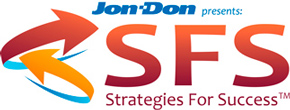Sometimes the simplest sentences can have the most profound effect on our relationships with people. For example, I’ve written before about the value and therapeutic effect of offering a simple, “I’m sorry” to someone we’ve wronged in either word or deed. And of course another example of the long-lasting implications of a very short sentence is when we say, “I do!”
There’s another two-word phrase that’s fundamental for anybody who’s serious about leading people. Although it’s a simple phrase to articulate, sometimes it feels like pulling teeth to get some people to say it. The phrase I’m referring to here is “thank you.”
 Saying “thank you” to someone requires a certain amount of humility on the part of the person saying it. Maybe this is one of the reasons why so many business owners struggle with it. They’re afraid that by saying thank you to someone, it places that person in a superior position to them or gives the person some advantage over them. That’s simply not true.
Saying “thank you” to someone requires a certain amount of humility on the part of the person saying it. Maybe this is one of the reasons why so many business owners struggle with it. They’re afraid that by saying thank you to someone, it places that person in a superior position to them or gives the person some advantage over them. That’s simply not true.
I’ve even seen business owners who struggle so much with saying thank you that instead they lavish gifts on the person they want to thank. They must think this is better than verbalizing the actual words. It’s not.
Not only do many of us need to become more comfortable saying thank you, we also need to learn to say it more often. Some people act as though they’re rationing out their thank you’s, as if it’s better to save them up and then disgorge them all at once on the person they’re thanking! It’s almost as if they think that if they wait, it will have a bigger impact on the person being thanked. I’m not so sure that’s a good strategy.
“Thank you” is also the appropriate response in a couple instances you might not expect. For years I struggled with the problem of being uncomfortable when someone paid me a compliment. I thought it appeared arrogant if I acknowledged their flattering remarks. So I offered all kinds of reasons why I didn’t deserve their kind words, or downplayed the achievement they were complimenting. I realize now that by down-playing their compliment, I was essentially telling them they made a mistake. What I should have done was just offer a sincere “thank you.”
If you really want to test your ability to say thank you, try saying it when someone criticizes you. Thanking someone when they pay you a compliment is one thing. Thanking them when they correct you is quite another. The next time someone says something like, “You never take my suggestions seriously,” rather than answering with the standard, “Oh, yes I do,” try responding with, “Thank you. I didn’t realize you felt that way.” Or, when someone offers you unsolicited advice, simply tell them thank you. There’s no need to counter their suggestion with your “better” idea, or to qualify your response to it. Just let them know you’re glad they brought it to your attention. After all, you are, aren’t you?
Saying “thank you” in any language is music to your listener’s ears, and one of the beauties of saying thank you is that nothing bad will come of it. So, it doesn’t matter whether you say thank you, gracias, arigato, merci, toda, danke, hvala vam, or spasibo, the person hearing it will be glad you said it!
Chuck Violand (more about Chuck)
SFS Instructor
CEO Violand Management Associates
